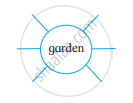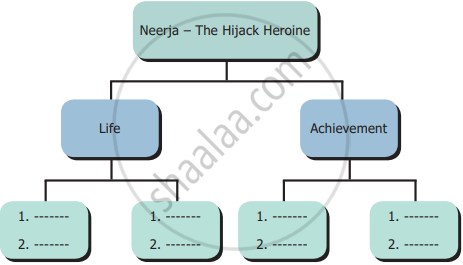Advertisements
Advertisements
प्रश्न
The description of the character is given below. Identify the character from the play. Find some sentences which support your choice.
He is a major character. He dominates in the story.
उत्तर
The character is the Sergeant.
He is a major character
- (Sergeant, who is older than the others, crosses the stage to right and looks down steps.)
He dominates the story
- Well, hurry on, you have plenty of other places to placard yet, and come back here than to me. You can take the lantern. Don‘t be too long now.
- Come back from those steps; no one has left to pass down them tonight.
- Stop that noise.
- It‘s no business of yours what I think.
- If you don‘t stop that, I‘ll arrest you.
- Bring it with you I tell you. No more talk.
- Be off the two of you, yourselves, and your lantern!
APPEARS IN
संबंधित प्रश्न
You are Smitha/Sunil, Secretary AVM Housing Society. You are going to organize a yoga camp. Write a notice in not more than 50 words, urging the members of your society to come in large numbers to attend the camp. Invent all the necessary details.
(i) The interest of Maharashtra and that of India should be one for the progress of Maharashtra state, because ................
Discuss the following statement in groups of two pairs, each pair in a group taking opposite points of view.
The story is called ‘The Adventure’. Compare it with the adventure described in ‘We’re Not Afraid to Die...’
“I have done something; oh, God! I've done something real at last.” Why does Andrew say this? What does it mean?
Discuss the following in pairs or in groups of four:
Because India's tribal communities are basically bilingual there is a danger of dismissing their languages as dialects of India's major tongues.
In English, the peacock is associated with pride. ‘As proud as a peacock’ is a commonly used simile. With what qualities is the peacock associated with the literature of your language?
How does Kumudini Lakhia describe her guru Ramgopal's influence on her?
The poem has a literal level and a figurative level. Why has the poet chosen 'tigers' and 'sheep' to convey his message?
Read the extract 'Being Neighborly' and complete the following statement:
Jo swept a path around the garden for ________________.
Read the story and complete the following.
When Revathi played her favourite raga, the plants began to move because, ____________.
Using points from the lesson, give the details of the following in a short paragraph.
Different types of kites.
Discuss in your class.
Are robots truly useful to human beings? Why? Why not?
Expand the idea inherent in the following proverb :
If winter comes, can spring be far behind? - Shelley
Fill in the gap, choosing a word from the bracket to make an appropriate comparison.
(tall / quiet / humble / merry / busy / slippery / fast / sly / slow / big)
as ______ as a bee
Fill in the gap, choosing a word from the bracket to make an appropriate comparison.
as ______ as a worm
Read the description of the Kabaddi match and do the following:
Write, in your own words, what happened in the second half.
The word 'Review' is different from summarizing and appeal writing. Choose the correct statements of the following.
Find more information about other Param Vir Chakra awardees. Prepare a collage using photographs, pictures, and text matter written in beautiful handwriting.
Describe the following with the help of the story.
Thiruvalluvar
State a type of drama each from any four periods of history.
Read the given extract (Act III)
Complete the following table.
| Sr. No. | Character | Supportive Character | Incident |
| 1. | Dr. Stockmann |
|
|
| 2. | Peter Stockmann |
|
|
| 3. | Aslaksen |
|
|
Draw word webs for the following. Begin with the given word and go on writing as many other words associated with it, as you can. Use these words to write other related words to form a word web.

Write about what you would like to do if ‘Time’ was your friend.
Visit a library:
Read Lewis Carroll’s book ‘Alice in Wonderland.’
Write about Malti and Rima using the following points:
 |
 |
| Appearance... | Appearance... |
| Studies... | Studies... |
| Singing... | Singing... |
| Attitude to others... | Attitude to others... |
| Weak points... | Weak points... |
Use details from the story and your own imagination when you write the above descriptions.
Think and answer:
Why are the sights said to ‘fly’?
Read the following and observe the use of tenses.
‘Last week I witnessed a strange accident. Let me tell you about it. The signal flashes green. Vehicles start in the opposite direction. They move fast. Suddenly a speeding motorcyclist tries to cut across, from the wrong side. He is about to collide with a loaded truck. He applies the brakes. He falls and slides out with his bike from under the truck. He comes out unscathed on the other side.’
- When an event, which has occurred in the past, is narrated in the Present Tense to create a dramatic effect its Tense is called the ‘Dramatic Present Tense’.
- Now try to relate Jayant’s sci-fi story, in brief, in the dramatic past tense.
Answer the following question and write in short, why the parody sounds funny.
Is the bee a gentle creature? Is the crocodile gentle?
Read ‘The Story of the Amulet’ by E. Nesbit.
Complete the following phrases with the help of the poem.
- ______ music
- ______ rivers
- ______ breeze
- ______ lake
- ______ citron-trees
Say whether you agree or disagree.
The wolf could not trace Bertha because she was behind a myrtle bush.
Form a group of four to six. As a group activity, write a conversation in which a person/a group of person thanks to someone.
Read the word. Write the words that combine to make it.
snowwhite
Which event in the story tells us that the scarecrow was intelligent?
Find a word that has a similar meaning.
unfair
Guess the meaning of the following word.
pleasing
Read the following line from the poem and answer the question given below.
| And so it were wisest to keep our feet From wandering into Complaining Street; |
- What is the wisest thing that the poet suggests?
- What does the phrase ‘to keep our feet from wandering’ refer to?
He decided to find his cousins’ home without their help. He asked the policeman for information in Italian because he.
Write the name of the toys against each picture.

Usha went to visit her______ house after shopping in the market.
Read the “Story of Self Sacrifice and Bravery” once again and complete the flow chart.

Who is Raj?
Which planet has red storm?
When did the battle of Nauranang start? How long did it continue?
Vicky pleaded his father to buy a robot.
What did they use as net?
What was their new hobby?
The message was to gather on ______.
What is the name of the girl?
Where does the scene take place?
Do you love to seek answers to the questions?
Write the word under the correct group and divide it.
bullet
candle
bat
title
ball
tiffin
 |
 |
 |
______always stays to the last in our needs.
Kani took Teddy out for a ____.
Speak and win.
Join in one of the two groups. Choose two characters. Support or oppose any one of the characters. Say some sentences for the one you support and say some sentences against the other one, to win.
| I support | I oppose |
Why did Bala go to Chennai with his father?
The child won’t ______ anything, if he closes his ears.
A person who overcomes problems, will get ______ at the end.
Do we worry when the progress is slow?
Read the following passage and answer the questions that follow:
The Stationmaster’s Supreme Sacrifice by Sanchari Pal (Adapted)
- Thirty-three years ago, on the night of December 2, 1984, Bhopal was hit by a catastrophe that had no parallel in the world’s industrial history. An accident at the Union Carbide pesticide plant in Bhopal had released almost 30 tons of a highly toxic gas called methyl isocyanate, turning the city into a vast gas chamber. The result was a nightmare; more than 600,000 people were exposed to the deadly gas cloud that left thousands dead and many more breathless, blind and in agonizing pain. Few people know that during the Bhopal gas tragedy a heroic stationmaster risked his own life to save others.
- On the evening of December 3, 1984, Ghulam Dastagir was settling down in his office to complete some pending paperwork. This work kept him in his office till 1am in the night, when he emerged to check the arrival of the Gorakhpur Mumbai Express. As he stepped on to the platform, the deputy stationmaster felt his eyes burn and a queer itching sensation in his throat. He did not know that poisonous fumes leaking from Union Carbide’s pesticide factory were stealthily enveloping the railway station.
- Beginning to choke, Dastagir did not know then that twenty-three of his railway colleagues, including his boss, station superintendent Harish Dhurve, had already died. It was later reported that Dhurve had heard about the deadly gas and had immediately tried stopping the movement of trains passing through Bhopal before collapsing in his office chamber. His suddenly worsening health and years of experience told Dastagir that something was very wrong. Though he did not fully comprehend what was happening, he decided to act immediately when he did not get any response from the station master. He alerted the senior staff at nearby stations, like Vidisha and Itarsi, to suspend all train traffic to Bhopal.
- However, the jam-packed GorakhpurKanpur Express was already standing at the platform and its departure time was 20 minutes away. Listening to his gut instinct, Dastagir summoned his staff and told them to immediately clear the train for departure. When they asked if they should wait until the order to do so came from the head office, Dastagir replied that he would take complete responsibility for the train’s early departure. He wanted to ensure that the train left immediately, without any delay. His colleagues later recalled that Dastagir could barely stand and breathe as he spoke to them. Breaking all rules and without taking permission from anyone, he and his brave staff personally flagged off the train.
- But Dastagir’s work was not done. The railway station was filling up with people, desperate to flee the fumes. Some were gasping, others were vomiting, and most were weeping. Dastagir chose to remain on duty, running from one platform to another, attending, helping and consoling victims. He also sent an SOS to all the nearby railway offices, asking for immediate medical help. As a result, four ambulances with paramedics and railway doctors arrived at the station. It was winter and the gas was staying low to the ground, a thick haze poisoning everything in its path. Besieged by hordes of suffering people, the station soon resembled the emergency room of a large hospital. Dastagir stayed at the station, steadfastly doing his duty, knowing that his family was out there in the ill-fated city. That day all he had for his protection was a wet handkerchief on his mouth.
- Ghulam Dastagir’s devotion to duty saved the lives of hundreds of people. However, the catastrophe didn’t leave him unscathed. One of his sons died on the night of the tragedy and another developed a lifelong skin infection. Dastagir himself spent his last 19 years shuttling in and out of hospitals; he developed a painful growth in the throat due to prolonged exposure to toxic fumes. When he passed away in 2003, his death certificate mentioned that he was suffering from diseases caused as a direct result of exposure to MIC (Methyl Isocyanate) gas. A memorial has been built at platform No.1 to pay tribute to those who sacrificed their lives in the line of duty on the fateful night of December 3, 1984. However, Ghulam Dastagir, who died later, is not one of them. A forgotten hero whose sense of duty and commitment saved countless lives, Dastagir’s story deserves to be recognized and remembered by our fellow countrymen.
- Why was the accident at Union Carbide unparalleled in the world’s industrial history?
- How was Dastagir affected by the poisonous gas?
- What was the action taken by the station superintendent?
- How did Dastagir and his staff break rules?
- What was the cause of Dastagir’s death?
- Find words from the passage which mean the opposite of the following.
- safeguard (para 1)
- common or familiar (para 2)
- prompt (para 4)
- cause (para 6)
